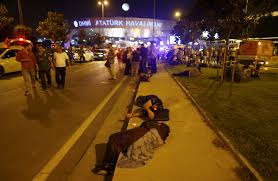
(Credit: cnipo.com)
The attack on Istanbul airport by suspected Islamic State terrorists is a classic example of unintended consequences, or what the CIA calls blowback.
But having turned a blind eye to the menace of Islamic State across its southern border for strategic reasons, Turkey can hardly be surprised at what is now occurring.
Turkish Prime Minister Binali Yildirim says it is highly likely Islamic State is responsible.
If so, it will be the third terror attack committed by the group in Turkey this year.
Add in the gathering violence committed by Kurdish separatists and it is clear that Turkey, once described as the most cosmopolitan country in the Islamic world, now faces a worsening crisis of religious and political violence.
The problem has been incubated by Ankara’s policies. Since the war began Turkey has used Syria’s innumerable opposition groups as a foil against the Assad regime, Turkey’s enemy and rival in the region.
Under President Recep Tayyip Erdogan, Turkey has been increasingly supportive of Islamist movements across the region, including Egypt’s Muslim Brotherhood, which in 2013 was overthrown in a military coup.
But as the Americans discovered when they funded the Mujaheddin against the Soviets in Afghanistan in the 1980s, terror groups like Islamic State and al-Qa’ida are “cold monsters’’. They have their own agendas, which will never align with the secular, liberal and peaceful society most Turks aspire to create. They are not your allies.
As a NATO member, Turkey has been an ally in the coalition air campaign against Islamic State, but a deeply reluctant one. Late last year it finally began launching sorties against Islamic State targets inside Syria and northern Iraq after much international pressure and a suicide attack in the border town of Suruc, which killed 34.
Turkey has also been broadly supportive of Australia’s efforts to suppress Islamic State, catching, where it can, transiting Australian fighters and deepening its co-operation with our police and intelligences agencies.
But traditionally Ankara has shown more enthusiasm for bombing hostile Kurdish groups such as the PKK which have exploited the chaos in Syria and northern Iraq to establish a foothold on its border.
This has hindered the campaign against Islamic State as Kurdish fighting units are among the most effective troops in the Syrian-Iraq theatre.
Turkey has also allowed Islamist militants free reign at the border, both to smuggle foreign fighters into Syria and to move contraband, like oil, out of it. This has greatly contributed to Islamic State’s strength and wealth. But now, like spores to the wind, Islamic State’s attackers are spreading across the globe.
Yesterday’s attack was the third Islamic State assault in Turkey this year. It is unlikely to be the last.

